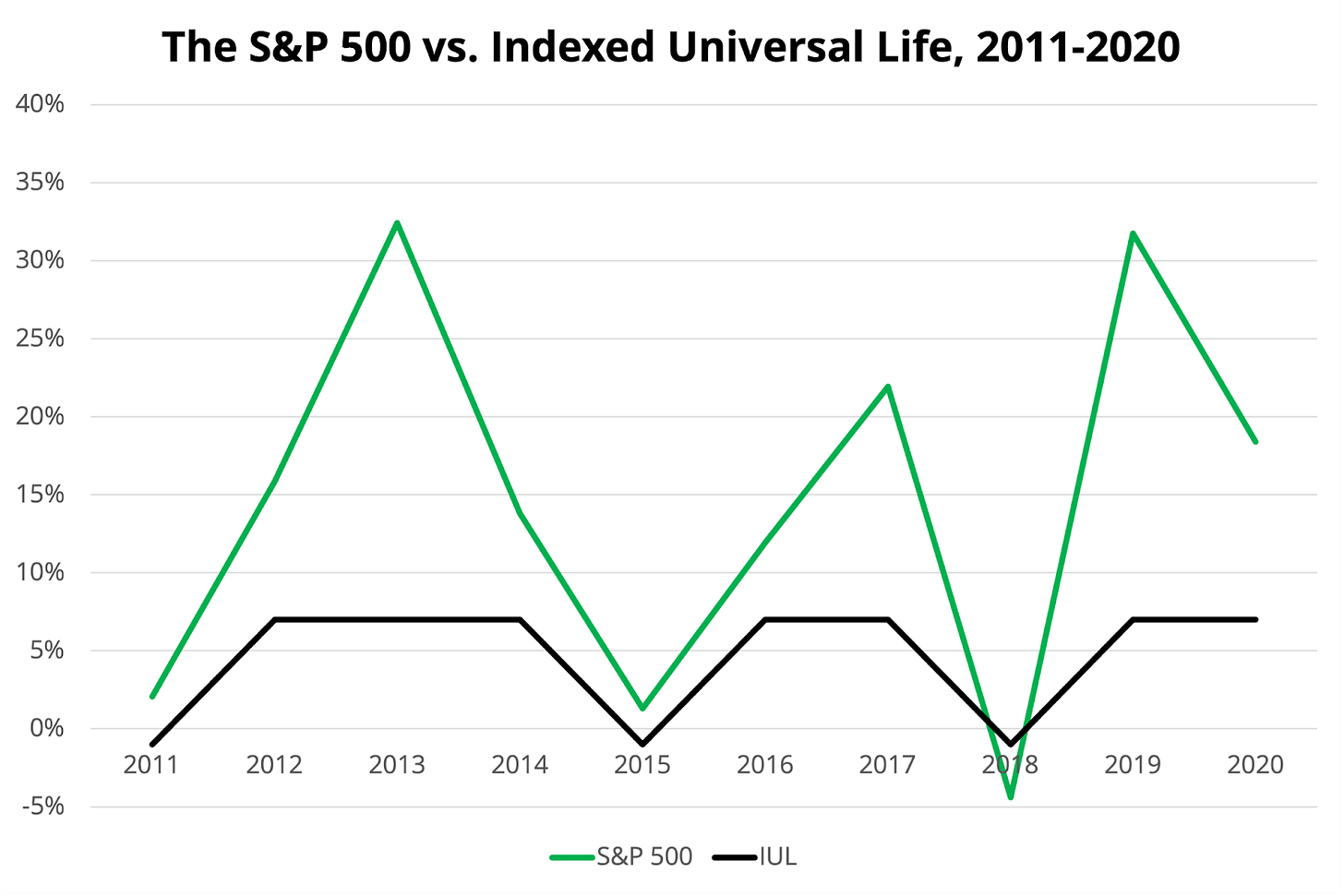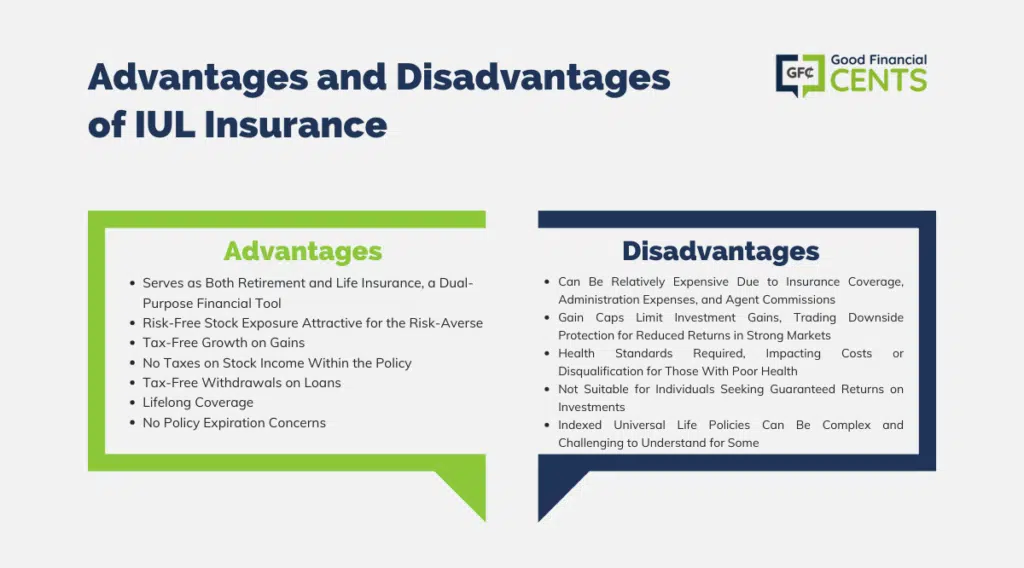All Categories
Featured
Table of Contents
1), typically in an attempt to defeat their group averages. This is a straw guy disagreement, and one IUL folks enjoy to make. Do they compare the IUL to something like the Vanguard Total Amount Stock Market Fund Admiral Shares with no load, an expenditure proportion (EMERGENCY ROOM) of 5 basis points, a turnover ratio of 4.3%, and a phenomenal tax-efficient document of circulations? No, they compare it to some terrible proactively taken care of fund with an 8% tons, a 2% EMERGENCY ROOM, an 80% turn over proportion, and a dreadful document of short-term capital gain circulations.
Common funds usually make yearly taxed circulations to fund proprietors, also when the value of their fund has dropped in value. Common funds not only need earnings coverage (and the resulting annual tax) when the shared fund is rising in value, yet can additionally enforce income taxes in a year when the fund has gone down in worth.
You can tax-manage the fund, gathering losses and gains in order to reduce taxable distributions to the investors, yet that isn't somehow going to change the reported return of the fund. The ownership of shared funds may require the mutual fund owner to pay estimated taxes (ul mutual insurance).

IULs are easy to place to ensure that, at the owner's fatality, the beneficiary is exempt to either revenue or inheritance tax. The very same tax decrease techniques do not function virtually as well with mutual funds. There are countless, typically expensive, tax traps connected with the timed buying and selling of common fund shares, traps that do not relate to indexed life Insurance policy.
Opportunities aren't really high that you're going to undergo the AMT as a result of your common fund circulations if you aren't without them. The rest of this one is half-truths at ideal. For circumstances, while it holds true that there is no revenue tax due to your heirs when they acquire the profits of your IUL plan, it is also real that there is no income tax due to your heirs when they acquire a shared fund in a taxed account from you.
Index Whole Life Insurance
The government estate tax obligation exception limit is over $10 Million for a couple, and growing each year with inflation. It's a non-issue for the vast bulk of doctors, a lot less the rest of America. There are much better methods to avoid inheritance tax concerns than getting investments with low returns. Common funds may create income taxes of Social Security advantages.

The growth within the IUL is tax-deferred and may be taken as tax free revenue through financings. The policy owner (vs. the shared fund manager) is in control of his or her reportable income, hence allowing them to reduce or perhaps get rid of the taxes of their Social Safety and security advantages. This one is wonderful.
Below's one more very little issue. It's real if you acquire a shared fund for state $10 per share right before the circulation date, and it disperses a $0.50 circulation, you are after that mosting likely to owe taxes (possibly 7-10 cents per share) although that you have not yet had any type of gains.
In the end, it's actually concerning the after-tax return, not how much you pay in tax obligations. You are going to pay more in tax obligations by using a taxed account than if you get life insurance. You're also most likely going to have even more money after paying those taxes. The record-keeping needs for possessing mutual funds are considerably extra complex.
With an IUL, one's documents are maintained by the insurance policy company, duplicates of annual statements are mailed to the owner, and distributions (if any kind of) are amounted to and reported at year end. This one is additionally sort of silly. Of program you must keep your tax obligation records in instance of an audit.
Best Universal Life Insurance Rates
All you need to do is shove the paper into your tax folder when it reveals up in the mail. Rarely a reason to acquire life insurance policy. It's like this man has never purchased a taxable account or something. Shared funds are commonly part of a decedent's probated estate.
Additionally, they undergo the hold-ups and expenditures of probate. The profits of the IUL policy, on the various other hand, is always a non-probate circulation that passes outside of probate directly to one's called beneficiaries, and is therefore not subject to one's posthumous financial institutions, undesirable public disclosure, or comparable hold-ups and prices.
Medicaid incompetency and life time income. An IUL can give their owners with a stream of earnings for their entire lifetime, no matter of just how lengthy they live.

This is advantageous when arranging one's affairs, and converting properties to revenue prior to a retirement home arrest. Shared funds can not be converted in a similar manner, and are virtually always thought about countable Medicaid assets. This is one more foolish one promoting that inadequate individuals (you understand, the ones who need Medicaid, a federal government program for the bad, to pay for their nursing home) ought to make use of IUL as opposed to shared funds.
Indexed Universal Life Insurance Complaints
And life insurance policy looks awful when compared relatively versus a retirement account. Second, people that have money to acquire IUL above and past their pension are going to need to be dreadful at managing cash in order to ever before receive Medicaid to spend for their assisted living home expenses.
Chronic and terminal disease motorcyclist. All policies will permit a proprietor's easy access to cash money from their plan, often forgoing any surrender penalties when such individuals endure a major ailment, need at-home treatment, or end up being restricted to an assisted living facility. Shared funds do not offer a comparable waiver when contingent deferred sales costs still apply to a mutual fund account whose proprietor requires to offer some shares to money the expenses of such a keep.
Universal Life Online
Yet you get to pay even more for that benefit (cyclist) with an insurance coverage policy. What a lot! Indexed global life insurance policy offers survivor benefit to the recipients of the IUL proprietors, and neither the proprietor neither the recipient can ever before lose cash due to a down market. Shared funds give no such warranties or survivor benefit of any type of kind.
Now, ask yourself, do you actually require or want a survivor benefit? I definitely don't require one after I reach monetary self-reliance. Do I desire one? I suppose if it were low-cost enough. Obviously, it isn't affordable. Generally, a purchaser of life insurance coverage spends for real cost of the life insurance policy advantage, plus the expenses of the policy, plus the earnings of the insurance policy firm.
New York Life Indexed Universal Life Insurance
I'm not entirely certain why Mr. Morais tossed in the whole "you can not shed money" again here as it was covered quite well in # 1. He simply wanted to duplicate the most effective selling factor for these things I intend. Once again, you do not shed nominal bucks, yet you can shed genuine dollars, along with face severe opportunity cost because of low returns.

An indexed universal life insurance coverage plan proprietor might trade their policy for a completely different policy without triggering income taxes. A shared fund owner can stagnate funds from one common fund firm to an additional without marketing his shares at the former (hence setting off a taxable occasion), and buying new shares at the last, usually subject to sales fees at both.
While it is real that you can trade one insurance plan for one more, the factor that people do this is that the initial one is such a horrible policy that even after purchasing a brand-new one and undergoing the very early, unfavorable return years, you'll still come out ahead. If they were marketed the right plan the very first time, they shouldn't have any kind of desire to ever trade it and undergo the very early, negative return years again.
Latest Posts
Universal Life Insurance Quote Calculator
Difference Between Universal And Whole Life
Ideal Universal Life